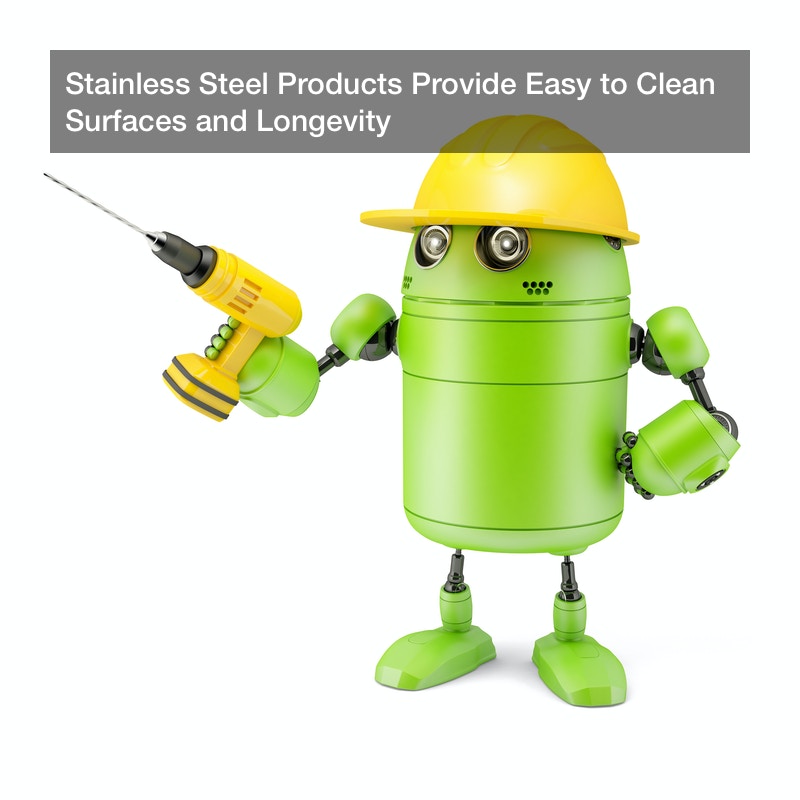Stainless Steel Products Provide Easy to Clean Surfaces and Longevity


Back in October a physician’s assistant told you that your nose looked like an allergy nose. You have never suffered from allergies before, other than cats, and just ignored the PA because the only symptom you had was a constant runny nose. With the beautiful weather this week, however, you have had your windows open and you have felt not quite right all week. The combination of sneezing more than usual, dry and scratchy throat, nasal congestion when you lay down, an annoyingly dull forehead headache off and on all week have been more than a minor annoyance. You initially assumed the headache was from a lack of caffeine, but now you are wondering if this is indeed your new normal. Scheduling an appointment with the PA is on the top of your list and you have been asking friends with allergies if this what they suffer with. You know allergies can appear at any age, but these symptoms really stink because you love opening your windows.
Rethinking the smallest sniffle or even the rarest cough is common today. And in a time of figuring out just how to navigate the latest announcements by the Centers for Disease Control, politicians, and scientists, it should come as no surprise that many businesses are erring on the side of caution. From the installation of new sanitary pipe hangers and other kinds of sanitary valves to the newly replaced stainless steel sanitary strainers in industrial kitchens and warehouses to the mandate that all workers who are dealing with the public will wear cloth masks, there are many changes that are taking place as the nation considers the best options for opening back up in stages. Fortunately, for allergy sufferers and those with immune deficiencies, many of the changes that are being made will allow all of us to live in a more clean and safe environment.
What Changes Is Your Workplace Making in Response to Covid-19?
Stainless Steel 304 is the number one most common grade of stainless steel, and it may come as no surprise that there are a number of businesses are using this versatile product to their greatest advantage. The fact that stainless steel sanitary pipe hangers and other parts are easier to keep clean, in fact, means that businesses are using some of the stimulus money that they may have received to upgrade their spaces to environments that are easier to keep clean and sanitized.
Consider some of these other facts and figures about the use of sanitary pipe hangers and other stainless steel products, not only in normal times, but also today when there is a increased awareness on cleaning and sanitizing:
- Laboratory equipment, jet engine parts, boat fittings, food and pharmaceutical processing equipment, and chemical containers are five of the most common applications for Stainless Steel 316. In a time when the entire world is more focused on sanitization processes, it should come as no surprise that the need for stainless steel sanitary pipe hangers and other items is increasingly important in all of these industries.
- With the majority classified into five major groups in the family of stainless steels, there are more than 100 grades of stainless steel. Basically, the divisions are labeled as austenitic, ferritic, martensitic, duplex, and precipitation-hardening.
- As much as 88% of the world’s steel is recycled, according to the American Iron and Steel Institute. This organization also reports that two out of three tons of new steel come from old steel, which is an added bonus to everyone who is focused on using recycled materials.
- Accounting for the fact that so many of these products can be used in a variety of ways, stainless steels are used at temperatures up to 1700° F for 304 and 316 and up to 2000 F for the high temperature stainless grade 309(S) and up to 2100° F for 310(S).
- Under typical conditions stainless steel pipes can easily exceed a 100 year lifespan, so it is important to note that there are many companies are encouraged that their most recent investments in upgrading their facilities are going to stand the test of time.
The world as we know it is changing, but the role stainless steel plays remains important.
